Intel Beast Canyon NUC Review: Desktop Tiger Lake Debuts in SFF Gaming Powerhouse
by Ganesh T S on July 29, 2021 9:00 AM EST- Posted in
- Systems
- Intel
- NUC
- Tiger Lake
- NUC11
- Beast Canyon
BAPCo SYSmark 25
The Intel NUC11BTMi9 (Beast Canyon) was evaluated using our Fall 2018 test suite for small-form factor PCs. In the first section, we will be looking at SYSmark 25.
BAPCo's SYSmark 25 is an application-based benchmark that uses real-world applications to replay usage patterns of business users in the areas of productivity, creativity, and responsiveness. The 'Productivity Scenario' covers office-centric activities including word processing, spreadsheet usage, financial analysis, software development, application installation, file compression, and e-mail management. The 'Creativity Scenario' represents media-centric activities such as digital photo processing, AI and ML for face recognition in photos and videos for the purpose of content creation, etc. The 'Responsiveness Scenario' evaluates the ability of the system to react in a quick manner to user inputs in areas such as application and file launches, web browsing, and multi-tasking.
Scores are meant to be compared against a reference desktop (the SYSmark 25 calibration system, a Lenovo Thinkcenter M720q with a Core i5-8500T and 8GB of DDR4 memory to go with a 256GB M.2 NVMe SSD). The calibration system scores 1000 in each of the scenarios. A score of, say, 2000, would imply that the system under test is twice as fast as the reference system.
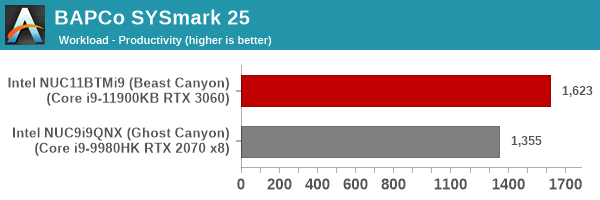
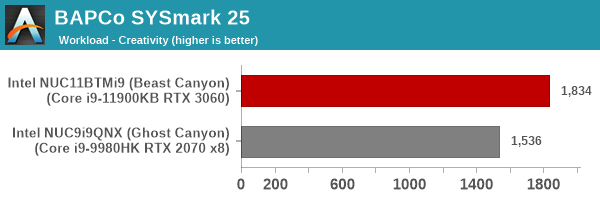
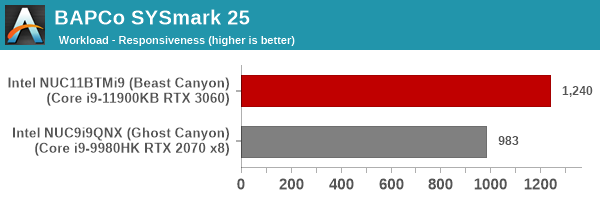
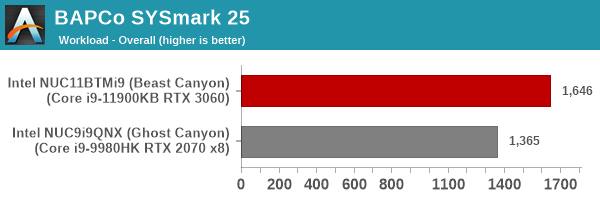
SYSmark 25 also adds energy measurement to the mix. A high score in the SYSmark benchmarks might be nice to have, but, potential customers also need to determine the balance between power consumption and the efficiency of the system. For example, in the average office scenario, it might not be worth purchasing a noisy and power-hungry PC just because it ends up with a 2000 score in the SYSmark 2014 SE benchmarks. In order to provide a balanced perspective, SYSmark 25 also allows vendors and decision makers to track the energy consumption during each workload. In the graphs below, we find the total energy consumed by the PC under test for a single iteration of each SYSmark 25 workload. For reference, the calibration system consumes 8.88 Wh for productivity, 10.81 Wh for creativity, and 19.69 Wh overall.
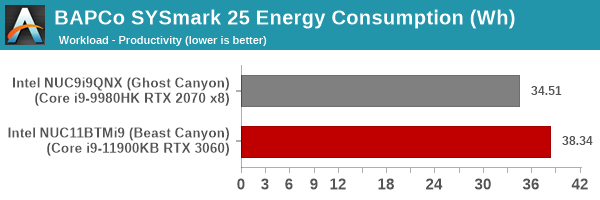
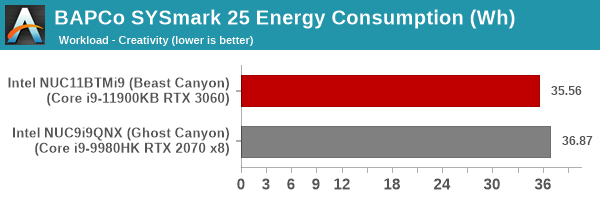
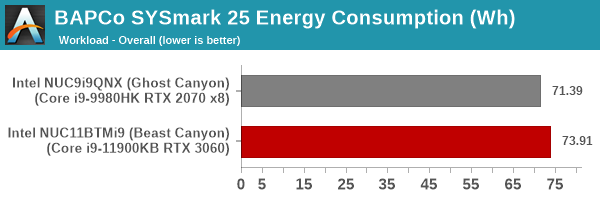
The Beast Canyon outscores the Ghost Canyon by around 20%. The increase in energy consumption is miniscule.










84 Comments
View All Comments
dullard - Thursday, July 29, 2021 - link
Have you actually done the math on how infrequently ECC actually helps the typical user?So what if roughly once a year, I get a one bit change in my audio for a split second, or a single pixel changed on my video, or my photo needs to load twice from Facebook, etc. Most people just don't have anything that is valuable on their personal computers any more. Almost nothing most people do now on computers will care if a memory error occurs. Combine that with the very infrequent memory errors and it just isn't a problem.
Absolute worst case scenario: I have to restore one corrupted file from backup.
With servers, ECC certainly is needed. With certain financial and security applications, ECC is definitely needed. For people to repost spam on Facebook? Nope, ECC need not found.
willis936 - Thursday, July 29, 2021 - link
Once you start climbing up the bathtub curve it isn't one bit flip every year. It's dirty bits constantly written to disk. It's a real nightmare.Spunjji - Friday, July 30, 2021 - link
"constantly"Not really
willis936 - Friday, July 30, 2021 - link
Yes, it is. I just ditched a system that could no longer install an OS without error. Memory tests hung. It wasn't the modules. Dust had shorted some memory channel pins and either damaged the motherboard or CPU.There were bad blocks all over the disk. I ran fsck to get back the user's files but there is no telling if the data's any good.
Do you even know what a bathtub curve is?
mode_13h - Monday, August 2, 2021 - link
> Have you actually done the math on how infrequently ECC actually helps the typical user?If you have bad RAM, it can be a major source of system instability. I think this is the primary benefit of ECC.
I've wasted time debugging software problems, in the past, only to find out that the problem was specific to a given machine and that machine turned out to have bad RAM. Once the DIMM indicated by memtest was replaced, the bug stopped occurring.
So, for the sake of my time and sanity, I use ECC whenever possible. Even though bad RAM isn't that common, the premium for ECC is a small price to pay for the extra margin of safety.
When ECC isn't an option, I always do an initial overnight memtest run and try to use memory rated for a higher speed than what I plan to run it at.
dullard - Thursday, July 29, 2021 - link
And the more obvious retort, this is a "SFF Gaming Powerhouse", I asked why one would want ECC for it and you reply with "should be used only in game consoles or similar applications". Seems like you missed the point of the product.If there is another use case for this product that actually needs ECC, then I'm curious to know what that use case is.
willis936 - Thursday, July 29, 2021 - link
A powerful personal computer. NUCs are made to be personal computers. If they put a big CPU and GPU in it then it's going to handle workloads thrown at it. How does ECC not fit this use case?dullard - Friday, July 30, 2021 - link
SFF works best as portable gaming and home theater uses. Neither of which have any need for ECC.I'm not saying that some computers don't need ECC. It is just that desktop computers that need ECC usually aren't physical size limited, don't need to be portable, and/or don't need full size video cards. I'm just stumped as to any real use case that actually needs that particular combo. Every use case that I can think of where ECC helps (which is not really common for personal users) either doesn't need SFF or doesn't need a large video card. It sounds much more like a wish list than a real need.
Spunjji - Friday, July 30, 2021 - link
"It sounds much more like a wish list than a real need."Bingo, but some people's wish lists are backed up by some heavy post-hoc rationalization.
willis936 - Friday, July 30, 2021 - link
This thinking is painfully flawed.You don't *need* a computer of any kind. Why bother with a smartphone or a SFF desktop?